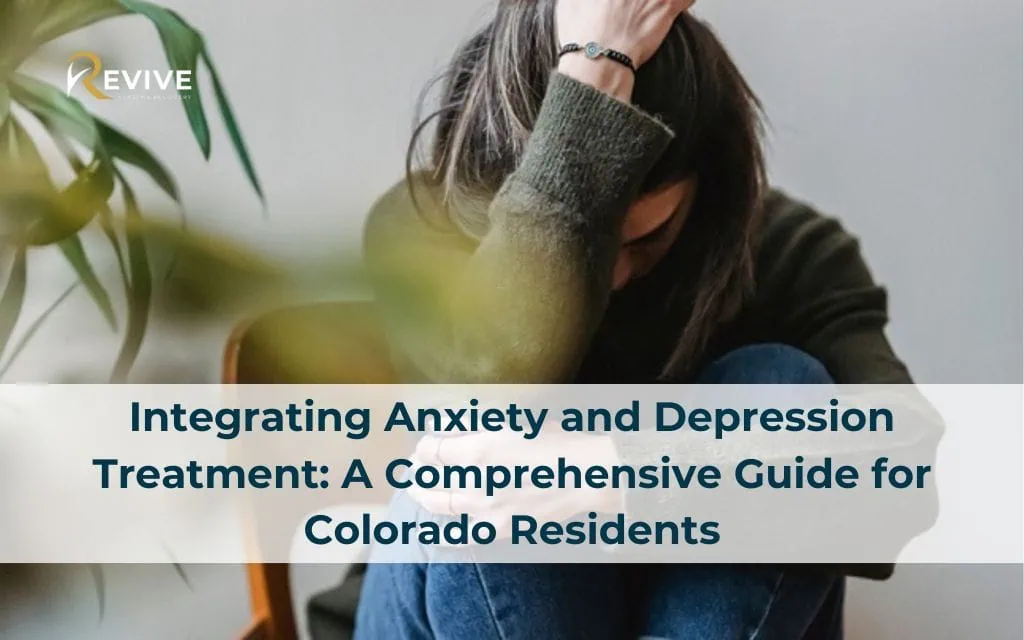In Colorado, where the stunning mountains meet a complex mental health landscape, nearly 30% of adults struggle with symptoms of anxiety and/or depression. The coexistence of these conditions, known as comorbidity, presents unique challenges for treatment. Traditional approaches often fail to address both conditions simultaneously, limiting recovery. Integrating anxiety and depression treatment offers a more holistic and effective solution. By combining evidence-based therapies, medication management, and local resources, residents can benefit from a comprehensive care plan that targets both conditions.
This integrated approach not only promotes healing but also provides finding peace strategies that help individuals reclaim their mental well-being. In this article, we’ll explore how Denver residents can access integrated treatments and leverage a range of therapeutic options to achieve lasting relief.
Understanding the Connection Between Anxiety and Depression
The Science Behind Comorbid Anxiety and Depression
The relationship between anxiety and depression is far more complex than simply experiencing two separate conditions simultaneously. Colorado’s mental health landscape has become increasingly challenging, with our state’s ranking dropping from 30th to 46th nationwide in mental health outcomes as of 2024 – a concerning trend that demands more sophisticated treatment approaches.
Neurobiologically, these conditions share several underlying mechanisms. Both involve dysregulation of similar neurotransmitters (including serotonin, norepinephrine, and dopamine) and affect overlapping brain regions such as the amygdala, hippocampus, and prefrontal cortex. This biological overlap explains why treating one condition often influences the other.
Colorado residents face unique environmental factors that can exacerbate both conditions. Denver’s high altitude affects oxygen levels, which can influence brain chemistry and medication effectiveness. The dramatic seasonal changes—from brilliant sunny days to sudden snowstorms—can trigger mood fluctuations in vulnerable individuals. Understanding these Colorado-specific factors is crucial when developing effective treatment strategies for local residents.
Why Treating Both Conditions Together Is More Effective
Research consistently demonstrates that integrating anxiety and depression treatment produces superior outcomes compared to addressing either condition in isolation. A study from the University of Colorado found that patients receiving integrated treatment showed a 40% greater improvement in symptoms compared to those receiving treatment for only one condition.
When we neglect to address both conditions, we often see a frustrating pattern: improvements in one area followed by setbacks as the untreated condition undermines progress. For example, a Denver patient might successfully reduce depressive symptoms through medication but continue to experience debilitating anxiety that prevents them from maintaining employment or social connections.
Local mental health providers like Pathlight Mood & Anxiety Center have reported that their integrated treatment protocols result in lower relapse rates and improved quality of life measures specifically among Denver residents. By addressing the full spectrum of symptoms, patients develop more comprehensive coping skills and resilience.
Conventional Treatment Approaches Available in Denver
Evidence-Based Therapy Options
Denver offers numerous evidence-based therapy options for those seeking integrated treatment for anxiety and depression. Cognitive Behavioral Therapy (CBT), widely recognized as a gold standard approach, is available through many qualified providers across the metro area. This therapy helps identify and change negative thought patterns that contribute to both anxiety and depression.
Acceptance and Commitment Therapy (ACT) has gained significant traction in Denver’s mental health community. This approach, which focuses on psychological flexibility and values-based action, is particularly effective for conditions that co-occur. The Denver Family Institute offers specialized ACT programs specifically designed for comorbid anxiety and depression.
Another powerful option is Interpersonal Therapy (IPT), which addresses relationship patterns that may contribute to or be affected by mental health conditions. Several Denver clinics, including the Helen and Arthur E. Johnson Depression Center, provide IPT as part of their comprehensive treatment programs, often integrating it with other therapeutic approaches for more personalized care.
Medication Management for Comorbid Conditions
Effective medication management is crucial when integrating anxiety and depression treatment. Several classes of medications—including selective serotonin reuptake inhibitors (SSRIs), serotonin-norepinephrine reuptake inhibitors (SNRIs), and atypical antidepressants—can address symptoms of both conditions, though finding the right medication and dosage often requires specialized expertise.
Denver is home to numerous psychiatrists who specialize in complex medication management for comorbid conditions. These professionals understand the unique challenges of prescribing for multiple conditions, including potential drug interactions and side effect profiles. Paramount Health Directions in Denver offers comprehensive medication management services specifically designed for patients with overlapping anxiety and depression.
For Colorado residents, insurance coverage for mental health services has improved following recent legislative changes requiring parity between mental and physical health coverage. However, coverage details vary significantly between plans, making it important to verify specifics before beginning treatment. Many Denver providers offer insurance verification services to help navigate these complexities.
When comparing effectiveness, research suggests that combining medication with therapy typically produces better outcomes than either approach alone. A recent analysis of treatment data from Colorado Center for Evidence-Based Treatment found that patients receiving both medication and therapy showed approximately 30% greater symptom reduction than those receiving single-modality treatment.
Complementary and Alternative Approaches in Colorado
Holistic Treatment Options in Denver

Denver’s approach to mental health increasingly embraces holistic options that complement traditional therapies. Mind-body practices have become integral components of many treatment plans, with centers like Mind Spa Denver offering specialized yoga and meditation programs specifically designed for those with anxiety and depression. These practices help regulate the nervous system while building mindfulness skills that interrupt negative thought patterns.
Nutritional approaches have gained scientific backing in recent years, with research demonstrating connections between gut health, inflammation, and mental wellness. Several Denver integrative psychiatrists now incorporate nutritional counseling and targeted supplement recommendations into their treatment protocols. Omega-3 fatty acids, vitamin D (especially important in Colorado’s winter months), and specific B vitamins have shown promise for supporting mental health.
Colorado’s natural environment offers unique therapeutic opportunities unavailable in many other states. Exercise therapy programs that leverage our extensive trail systems and outdoor spaces have shown remarkable effectiveness for improving both anxiety and depression symptoms. UCHealth Integrative Medicine offers “prescription nature” programs that combine structured outdoor activities with clinical support—a truly Colorado-specific approach to mental wellness.
Emerging Treatments Gaining Traction in Colorado
Denver has become a hub for innovative mental health treatments, including ketamine therapy for treatment-resistant depression and anxiety. Several specialized clinics now offer this service under careful medical supervision, with protocols specifically designed for patients with comorbid conditions. While not appropriate for everyone, these treatments have provided breakthrough relief for many who didn’t respond to conventional approaches.
Transcranial Magnetic Stimulation (TMS) is another cutting-edge therapy increasingly available in Denver. This non-invasive procedure uses magnetic pulses to stimulate nerve cells in brain regions involved in mood regulation. Multiple Denver providers now offer TMS services, often integrating them within comprehensive treatment plans that address both anxiety and depression simultaneously.
Colorado’s progressive cannabis laws have created unique opportunities for research and treatment incorporating CBD and cannabis-based approaches. Several Denver clinics now offer guidance on evidence-based use of these substances as part of integrated mental health care. While research is still evolving, many patients report benefits when these approaches are properly supervised within a comprehensive treatment plan.
Technology-based interventions, including virtual reality therapy for anxiety disorders, are increasingly available throughout Denver. These innovative approaches allow patients to practice coping skills in controlled simulations of challenging situations—a valuable complement to traditional therapy and medication approaches.
Creating an Integrated Treatment Plan in Denver
How to Build Your Mental Health Treatment Team
Finding the right providers is crucial when integrating anxiety and depression treatment. Denver is home to numerous integrative psychiatrists who specialize in comprehensive approaches to mental health. Look for providers who explicitly mention experience with comorbid conditions and who demonstrate openness to both conventional and complementary approaches.
Coordinating care between multiple providers can be challenging but is essential for truly integrated treatment. Many Denver practices now utilize collaborative care models where psychiatrists, therapists, and complementary practitioners work together within the same system. If your providers work in different settings, request signed releases allowing them to communicate about your care.
When interviewing potential providers, ask specific questions about their approach to treating anxiety and depression together. Inquire about their experience combining different treatment modalities, their willingness to coordinate with other providers, and their familiarity with Colorado-specific factors that might influence your care.
Denver offers several specialized referral networks that can help connect you with appropriate providers. The Colorado Psychiatric Society maintains a directory of psychiatrists searchable by specialty and location. Additionally, many primary care physicians in Denver have established relationships with mental health providers who specialize in integrated approaches.
Cost Considerations and Insurance Navigation
The financial aspects of mental health treatment can be complex, especially when integrating multiple approaches. In Denver, the cost of therapy typically ranges from $100-$200 per session, while psychiatric consultations may range from $200-$400 initially with follow-up appointments costing $100-$200. These figures vary widely based on provider experience, location, and specialization.
Colorado has expanded mental health coverage requirements in recent years, but insurance plans still differ significantly in their specific benefits. Most major insurers operating in Colorado now cover evidence-based treatments for both anxiety and depression, though coverage for complementary approaches varies widely. To understand your specific coverage, contact your insurance provider directly and ask about mental health benefits, in-network providers, and any requirements for authorization.

For uninsured Denver residents, several options exist for affordable integrated care. Community mental health centers like the Mental Health Center of Denver offer sliding-scale services. Additionally, several training clinics affiliated with local universities provide lower-cost therapy while maintaining high-quality care through close supervision.
When evaluating cost-effectiveness, consider the long-term picture. Research indicates that while integrated treatment may initially cost more than single-approach care, it often reduces long-term expenses by decreasing hospitalization rates, emergency service utilization, and work disability. A Colorado Department of Health study found that patients receiving integrated care had 40% lower healthcare costs over a five-year period compared to those receiving fragmented care.
For specific information about costs and insurance coverage for your situation, consider reaching out to Revive Health Recovery at (303) 268-4655. Their team can provide personalized guidance based on your insurance and needs.
Denver’s Leading Integrative Mental Health Providers
Specialized Clinics for Anxiety and Depression
Denver is fortunate to host several outstanding clinics specializing in integrated approaches to anxiety and depression. Revive Health Recovery stands out for its comprehensive care model that combines evidence-based therapies with innovative approaches tailored to each individual’s needs. Their multi-disciplinary team collaborates to ensure all aspects of mental health are addressed simultaneously.
Other notable Denver providers include Pathlight Mood & Anxiety Center, which offers intensive outpatient programs specifically designed for comorbid conditions, and Ballen Medical, known for integrating conventional psychiatry with complementary approaches. Each center offers unique specializations and approaches, making it possible to find care aligned with your specific preferences and needs.
When evaluating providers, consider both treatment philosophy and practical factors like location, availability, and insurance acceptance. Many Denver clinics now offer virtual options alongside in-person care, increasing accessibility for those with transportation challenges or busy schedules.
Community Resources and Support Networks
Beyond clinical treatment, Denver offers rich community resources that enhance recovery. Support groups specific to anxiety and depression are available through organizations like the Depression and Bipolar Support Alliance (DBSA) and the Anxiety and Depression Association of America (ADAA), both of which have active Denver chapters.
Community mental health initiatives like Colorado Spirit provide free resources specifically designed for Colorado residents facing mental health challenges. These programs often integrate well with clinical treatment, providing additional support and connection opportunities.
Online communities focused on Colorado mental health have grown significantly in recent years. These groups can provide valuable peer support and local resource recommendations while accommodating the schedules and comfort levels of diverse participants.
For crisis situations, Denver residents can access Colorado Crisis Services by calling 1-844-493-8255 or texting “TALK” to 38255. This statewide service provides immediate support and can connect callers to local resources for ongoing care. Remember that if you’re experiencing a mental health emergency, immediate help is available.
Creating Your Personal Roadmap to Recovery
Signs That Your Current Treatment Plan Needs Integration
Recognizing when your current approach isn’t sufficient is a crucial step toward better mental health. Common indicators include persistent symptoms despite compliance with treatment, improvement in some symptoms while others remain problematic, or cycling between anxiety and depression phases.
Several self-assessment tools can help you gauge treatment effectiveness. The PHQ-9 (for depression) and GAD-7 (for anxiety) are validated questionnaires widely used by Denver providers. Tracking your scores over time can reveal patterns and guide treatment decisions. The Colorado Health Institute recommends monthly self-assessment for those with chronic mental health conditions.
Consider adding complementary approaches when you’ve achieved partial improvement but reached a plateau, when medication side effects limit dosage increases, or when specific symptoms (like sleep disturbances or physical tension) persist despite psychological improvement.
Colorado residents should also consider seasonal patterns that may necessitate treatment adjustments. Our state’s dramatic seasonal changes can significantly impact mental health, with winter darkness affecting mood and summer’s intense sun potentially increasing anxiety for some individuals.
Tracking Progress and Adjusting Your Approach

Effective mental health care requires ongoing monitoring and adjustment. Many Denver providers now utilize digital tracking tools that allow patients to record symptoms, medication effects, and lifestyle factors between appointments. These tools help identify patterns and correlations that might otherwise be missed.
Communicate openly with your providers about your experiences. Specific, concrete examples are more helpful than general statements. Rather than saying “I’m still anxious,” try “I’ve had three panic attacks this week, all when driving on highways.” This specificity helps providers make more targeted adjustments to your treatment plan.
Timeline expectations for integrated treatment should be realistic. While some improvement may occur within weeks, significant and stable progress typically requires months of consistent treatment. Denver providers typically recommend committing to at least 3-6 months of integrated treatment before evaluating its overall effectiveness.
If outpatient care isn’t providing sufficient improvement, Colorado offers several more intensive treatment options. These include partial hospitalization programs (PHPs), intensive outpatient programs (IOPs), and residential treatment facilities. Denver’s mental health system provides multiple levels of care to match the varying needs of patients at different stages of recovery.
FAQs about Integrating anxiety and depression treatment
How do I know if I need treatment for both anxiety and depression?
If you experience persistent worry alongside low mood, have trouble distinguishing between anxious and depressed feelings, or find that treating one condition helps temporarily but symptoms return, you likely need integrated treatment. A comprehensive assessment by a qualified mental health professional at Revive Health Recovery can provide clarity about your specific needs and the most appropriate treatment approach.
Will my Colorado health insurance cover integrated mental health treatment?
Colorado law requires insurers to cover mental health services at parity with physical health services, though specific coverage details vary by plan. Most plans cover evidence-based treatments like therapy and medication for both anxiety and depression. For specific information about your coverage and affordable options, contact Revive Health Recovery at (303) 268-4655 for personalized guidance.
What natural supplements are most effective for anxiety and depression?
Research suggests omega-3 fatty acids, SAMe, St. John’s Wort (for mild depression), and L-theanine may offer benefits for some individuals. However, effectiveness varies significantly between people, and supplements can interact with medications. Revive Health Recovery offers professional guidance on evidence-based supplement use as part of a comprehensive treatment plan tailored to your specific needs.
How do I find a psychiatrist in Denver who supports both medication and alternative approaches?
Look for providers who identify as “integrative” or “holistic” psychiatrists or practices that explicitly mention combining conventional and complementary approaches. Revive Health Recovery employs professionals trained in both evidence-based psychiatric care and complementary approaches, ensuring truly integrated treatment under one roof. Call (303) 268-4655 to learn more about their integrative psychiatric services.
What makes Colorado’s approach to mental health treatment unique compared to other states?
Colorado’s approach often incorporates our natural environment (altitude considerations, outdoor therapy options), addresses cannabis use within a legal framework, and focuses on community-based care models. Denver specifically has developed specialized protocols that consider the city’s demographic profile and unique mental health challenges. Revive Health Recovery exemplifies this Colorado-specific approach, tailoring evidence-based treatments to our local context and population needs.
5 Reasons to Choose Revive Health Recovery for Integrating Anxiety and Depression Treatment
- Comprehensive Care Model: Revive Health Recovery specializes in truly integrated approaches that address anxiety and depression simultaneously using both evidence-based and innovative therapies.
- Denver-Specific Expertise: Our team understands Colorado’s unique mental health landscape, including altitude effects, seasonal patterns, and local resources that influence treatment effectiveness.
- Multidisciplinary Team: Unlike practices that offer only therapy or medication, Revive provides access to psychiatrists, therapists, and holistic practitioners who collaborate on your care.
- Personalized Treatment Plans: We recognize that everyone’s experience with anxiety and depression is unique, creating individualized plans that combine the most effective approaches for your specific situation.
- Ongoing Support System: Beyond clinical treatment, Revive offers resources for continued wellness, including group support options, education for families, and connections to community resources.
Conclusion
Integrating anxiety and depression treatment offers the most effective path to comprehensive mental wellness. By addressing both conditions simultaneously through a carefully coordinated approach, you can achieve more complete and lasting improvement than through fragmented care.
Denver residents are fortunate to have access to a wealth of resources for integrated mental health treatment, from specialized providers to innovative therapies that leverage our unique Colorado environment and culture.
If you’re struggling with both anxiety and depression, remember that effective help is available. The team at Revive Health Recovery is ready to guide you through creating a personalized, integrated treatment plan that addresses all aspects of your mental health needs.
Don’t wait to begin your journey toward comprehensive wellness. Contact Revive Health Recovery today at (303) 268-4655 or email contact@revivehealthrecovery.com to schedule an initial assessment. Our compassionate team is available 24/7 to answer your questions and help you take the first step toward integrated recovery.
Visit us at 1427 S Federal Blvd, Denver, CO 80219 to learn more about how our innovative approach to integrating anxiety and depression treatment can help you reclaim your life and achieve lasting wellness.



